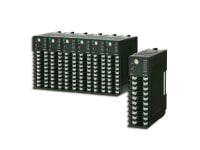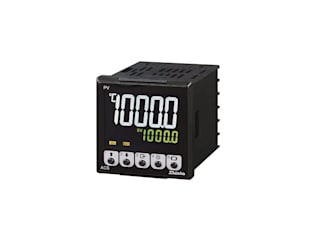Multi-channel temperature controllers - Qtc1-4 modular controllers
- Type of offer::
- Selling
- Price:
- ~456 EUR / pc
- Valid for:
- 28 days
-
- User:
- acse
- Company:
- ACSE Sp. z o.o.
- Name and surname:
- Tomasz Dąbek
- Contact:
Advantages of the QTC1-4/QTC1-2 series modular multi-channel controllers
-
Precise PID control
QX1 multi-channel controllers utilize advanced PID algorithms, including Fast-PID, Slow-PID, Gap-PID, 2DOF PID, and ON/OFF modes, allowing control to be tailored to the specific needs of each industrial process. This ensures that temperature, humidity, and pressure are maintained within tight tolerances, ensuring high product quality and process repeatability. -
Modular multi-channel design
The QX1 system consists of independent four-channel modules (QTC1-40T) and power and communication modules (QTC1-4PT), allowing for the configuration of up to 1,024 control loops . The modular design facilitates future system expansion and minimizes production downtime during plant modernization. -
Reduced cabling and space savings
By using a single multi-channel controller instead of many individual devices, the number of electrical connections can be reduced by up to 75% , which translates into lower installation costs and a lower risk of failure. -
Easy integration with industrial automation
QX1 controllers support RS-485 ModBus RTU communication and 24V DC power supply, allowing for easy connection to PLC, HMI, and SCADA systems. This makes the system flexible and compatible with various industrial automation platforms. -
Multi-zone process control
QX1 controllers are ideal for applications requiring control of multiple temperature or process zones simultaneously, such as industrial furnaces, dryers, autoclaves or HVAC systems.
Industrial applications of QTC1-4/QTC1-2 controllers
- Injection molding machines, extruders and moulders - precise temperature control of heating zones in plastics processing equipment.
- Packaging machines - advanced temperature control of sealing jaws in packaging and sealing machines.
- Food industry – temperature control of ovens, heating tunnels and dryers.
-
Chemical and pharmaceutical industry – precise control of reaction, drying, sterilization and incubation processes.
-
Energy and laboratories – temperature control in test and research systems.
-
HVAC systems and industrial air conditioning – temperature and humidity control in multiple zones of production buildings.
QTC1-4/QTC1-2 Multi-Channel Temperature Controller Models
-
QTC1-2 2-channel modular controller
A compact controller for a medium number of process zones. Ideal for small and medium-sized industrial plants requiring precise process control. -
QTC1-4 4-channel modular controller
An advanced, modular controller for large industrial processes, capable of handling multiple process loops and integrating with automation systems. The QTC1-4 model is particularly recommended for plants requiring high scalability and flexibility in process management.
Advanced functions of QTC1-4/QTC1-2 controllers
-
Multi-channel measurements of temperature and other parameters – the controller can monitor and regulate several measurement points simultaneously.
-
Process-specific PID modes – provide optimal control, minimize oscillations and increase process stability.
-
Automatic diagnostics and alarms – built-in functions allow you to quickly respond to process irregularities.
-
Remote control capability – full integration with SCADA systems enables control of process parameters remotely or from HMI panels.
Why is the QX1 modular controller the best choice for industry?
-
Precision control – advanced PID algorithms and the ability to control multiple process zones ensure stable and repeatable results.
-
Flexibility and scalability – the modular design allows the system to be easily expanded as production needs grow.
-
Save time and costs – fewer devices and electrical connections reduce installation and maintenance costs.
-
Easy integration with industrial automation – compatibility with PLC, HMI and SCADA facilitates system implementation in existing infrastructure.
-
Support for multi-zone process control – ideal for complex plants where simultaneous control of several parameters is crucial.
Summary
-
high precision and process stability ,
-
reduction of cabling and installation costs ,
-
easy integration with automation systems ,
-
ability to control multiple process zones simultaneously .




